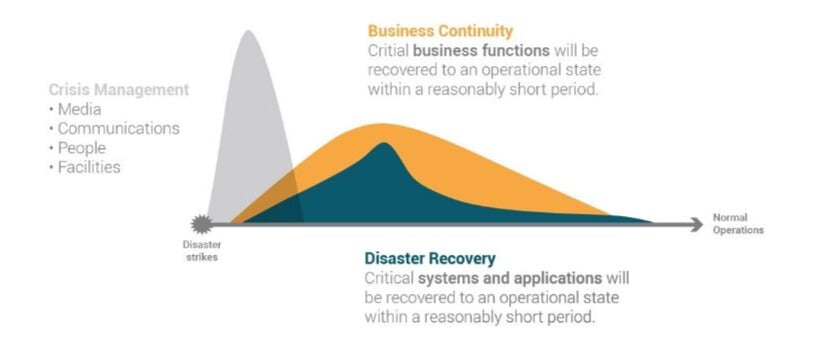Business Continuity vs. Disaster Recovery

Business Continuity versus Disaster Recovery - What is the difference?
While a comprehensive business continuity program will have aspects of a disaster recovery plan built into it, it is actually a master document that should encompass all aspects of a businesses preparedness plan, including prevention, mitigation, response, and recovery. A business continuity plan that does not include a recovery plan is not a comprehensive business preparedness model.

What is a Business Continuity?
A business continuity plan refers to the plan of action that will allow business to continue even during a disaster. It is a business centric plan that refers to processes that stakeholders take to ensure that normal business operations can continue in the face of disaster. The concept of business continuity is a broad one, and it starts well before any disasters strike, and ideally is never ending.
What is Disaster Recovery?
Disaster recovery is a more focused section that falls under the business continuity umbrella. It refers more specifically to the exact steps and technologies that will be used to recover from a disruptive event.
Rather than the broad focus of business continuity and finding ways to mitigate damage, disaster recovery focuses on how to get a business back to normal. This recovery works on transitioning from alternative business processes (caused by a disruptive event) back to regular processes. Mr Green comments on the specificity of this sort of plan, saying that “disaster recovery is how we recover our systems, applications and IT infrastructure during an incident.”
Time: The main difference between Business Continuity and Disaster Recovery
A key difference between these two plans is when the plan takes effect. Business Continuity pertains to keeping businesses functioning during an event as well as immediately after and in perpetuity. Disaster recovery focuses instead on how a business responds after the event has happened and plans on how to return to normal post-event.
Expert business preparedness
While there is a large overlap of business continuity and disaster recovery, each one still exists independent of the other. Different businesses may choose to focus more on one than the other, however risk management experts advise that having both a business continuity program and a disaster recovery plan is the best and safest way to ensure complete coverage should a disruptive event take place.
Having a comprehensive, actionable, and thoroughly tested business continuity programs can mean the difference between survival and a complete and abrupt shutdown.

5 Standards key to Business Continuity
Prepare for the unexpected with a business continuity strategy
To assist in with establishing or updating a business continuity management system, there are many Standards an organisation can implement to feel confident when preparing for and responding to a crisis.

6 Types of Business Continuity Risks
Discover 6 main categories of business continuity risks
COVID-19 is showing businesses the critical importance of expanding the scope of their business continuity and risk management programs. By learning from this recent worldwide threat, businesses will therefore adapt their programs and mitigate risk

The Importance of a Secure Supply Chain
Discover the role of Standards in supply chain security
An interconnected world means extensive supply chains to produce and deliver goods and services within the strict timeframes of demand. With an ever-expanding and global industry, the security of a supply chain must be considered to mitigate risks.
